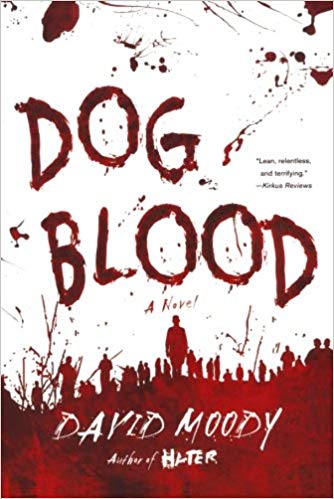 By DAVID MOODY (Thomas Dunne Books; 2010)
By DAVID MOODY (Thomas Dunne Books; 2010)
David Moody’s HATER was one of the 2009’s most vital and arresting genre novels. DOG BLOOD is the long-awaited follow-up, and the middle book of a projected trilogy. As such it bears the problems of most middle books/films (think THE EMPIRE STRIKES BACK or THE TWO TOWERS), namely that it functions primarily as a bridge between the first and last parts, and so isn’t entirely satisfying as a stand-alone story. Nevertheless, it definitely has its moments.
DOG BLOOD picks up where HATER left off, with society in ruins and existence reduced to a perpetual war. Former government employee Danny McCoyne is adjusting to life as a “Hater”—that is to say, a beast-like individual driven by raw aggression to brutalize and kill anyone who isn’t like him. As a Hater Danny finds himself focused completely on the “unchanged,” his eternal enemies who must apparently be snuffed out at all costs.
David is also obsessed with tracking down his young daughter Ellis. She’s a Hater herself, and so of great value to Danny’s Hater colleagues, who believe that kids make the best fighters. Danny for his part isn’t entirely sure why he so wants to reunite with Ellis—could it be his pre-Hater nature reasserting itself?
One of DOG BLOOD’S great virtues, which it shares with its predecessor, is its constant unpredictability. When early on in his quest Danny is captured and imprisoned by a band of apparent Unchanged seeking to cure him—increasing Danny’s inner conflict between his current and past nature–it seems the narrative arc is set. But of course it isn’t, as David Moody quickly switches gears with a most unexpected development involving the nature of Danny’s captors, leading to a climax that blends poignancy with mind-scraping brutality. Yes, Danny does indeed manage to track down his daughter…but what ultimately happens I’ll leave for you to discover on your own.
Outside the nastiness there’s a great deal of wit and cleverness to this novel; note the chapter headings, with those told from Danny’s Hater-addled POV denoted with numbers and others by roman numerals. The novel is also quite topical, and distressingly so, in its troubling look at a world torn apart by warring factions, with the only options being to submit to hate and aggression or fight against those who already have.
